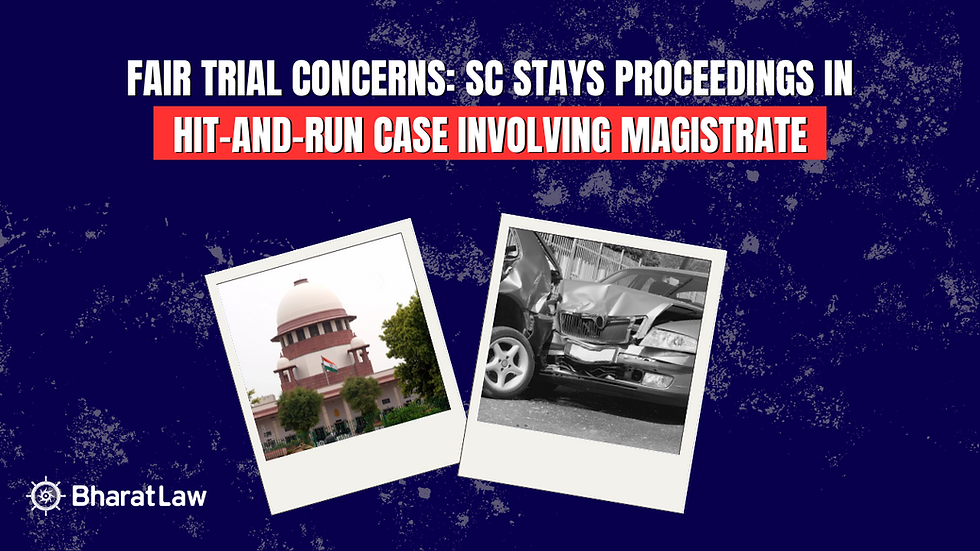Granting Bail Cannot Be Based on Utterly Irrelevant Material - Supreme Court's Verdict in Ajwar vs. Waseem and Others
- Chintan Shah

- May 22, 2024
- 4 min read
Updated: Jul 9, 2024
Summary of the Judgment
Case Name: Ajwar vs. Waseem and Others
Date: 17th May 2024
Judges: Honorable Justice Hima Kohli, Honorable Justice Ahsanuddin Amanullah
Advocates: For Appellant: Mr. Shreeyash U. Lalit and Mr. Ansar Ahmad Chaudhary For Respondents: Mr. Siddharth Luthra, Senior Advocate, and Mr. Sitab Ali Chaudhary For State of Uttar Pradesh: Mr. Sarvesh Singh Baghel
Acts and Sections: Sections 147, 148, 149, 302, 307, 352, 504 read with Section 34 of the Indian Penal Code, 1860 Section 439 of the Code of Criminal Procedure, 1973
Cited Judgements: Lakshmi Singh and others vs. State of Bihar and Others Babu Ram and Others vs. State of Punjab Amarjeet Singh vs. State of Haryana Mahipal vs. Rajesh Kumar @ Polia and Another Jagjeet Singh and Others vs. Ashish Mishra Deepak Yadav vs. State of Uttar Pradesh and Another P vs. State of Madhya Pradesh and Another Kalyan Chandra Sarkar vs. Rajesh Ranjan @ Pappu Yadav and Another Kumer Singh vs. State of Rajasthan and Another Yashpal Singh vs. State of Uttar Pradesh and Another Manno Lal Jaiswal vs. State of Uttar Pradesh and Another
Introduction
The judicial landscape in India frequently witnesses complex cases that test the boundaries of law and justice. One such intricate case is Ajwar vs. Waseem and Others, which revolves around a heinous crime of double murder and subsequent bail applications that raised critical questions on judicial discretion and the principles governing bail. This article delves into the Supreme Court's detailed analysis and judgment on the bail applications granted by the High Court to the accused, examining the legal intricacies involved and the broader implications for the Indian legal system.
The case, rooted in an incident from May 2020, highlights the severe consequences of criminal actions driven by enmity and the subsequent judicial processes aimed at ensuring justice. The Supreme Court's intervention underscores the necessity for a cautious and thorough approach in granting bail, especially in cases involving serious offences and potential threats to the judicial process. Through this examination, we aim to shed light on the critical judicial principles at play and the Supreme Court's role in maintaining the sanctity of legal proceedings in India.
Background of the Case
On the evening of the 19th of May, 2020, Ajwar, his two sons, and other individuals were preparing to break their fast when they were attacked by the accused, who fired indiscriminately. Ajwar's sons died on the spot, and his nephew was seriously injured. The prosecution alleged that the attack was motivated by previous enmity.
Proceedings and Bail Applications
The High Court granted bail to Waseem, Nazim, Aslam, and Abubakar on various dates, which were subsequently challenged by Ajwar. The main contention was that the High Court had not adequately considered the seriousness of the offence, the criminal antecedents of the accused, and the potential for witness tampering.
Supreme Court's Reasoning
Honorable Justice Hima Kohli and Honorable Justice Ahsanuddin Amanullah reviewed the decisions and circumstances under which the High Court had granted bail. The Supreme Court emphasized the following principles while considering bail applications:
Seriousness and Gravity of the Offence: The Supreme Court highlighted the gravity of the crime, noting that it involved a double murder. The bail granted by the High Court did not adequately address the seriousness of the allegations.
Role Attributed to the Accused: The specific roles of each accused in the crime were not sufficiently considered by the High Court. Eyewitnesses had provided detailed accounts implicating the accused.
Likelihood of Witness Tampering: There were instances where the accused had allegedly threatened witnesses. This significantly increased the risk of the accused tampering with evidence or intimidating witnesses if granted bail.
Criminal Antecedents: The accused had previous criminal records, which were overlooked by the High Court. This history indicated a higher likelihood of reoffending or evading trial.
Conduct of the Accused: The accused had attempted to delay the trial through various means, including filing transfer petitions and not cooperating with their counsel.
Key Observations
Failure of the High Court to Apply Judicial Mind: The Supreme Court found that the High Court had not applied its judicial mind adequately and had relied on generalized legal formulations without considering the specific facts of the case. The Court stated, "Merely setting down legal formulations cannot be a ground for granting bail."
Supervening Circumstances: The Supreme Court noted that the accused had threatened a key witness while on bail, which constituted a significant supervening circumstance warranting the cancellation of bail.
Judicial Discretion in Granting Bail: The Supreme Court reiterated that judicial discretion must be exercised judiciously, especially in serious criminal cases. The Court referenced its decision in P vs. State of Madhya Pradesh and Another, emphasizing the need for careful consideration of all relevant factors before granting bail.
Considerations for Granting Bail
The Supreme Court underscored that while considering bail in serious criminal offences, factors such as the nature of the accusations, the manner in which the crime was committed, the gravity of the offence, the role attributed to the accused, and their criminal antecedents must be meticulously examined. The likelihood of tampering with evidence and the probability of the accused repeating the offence if released on bail are also critical considerations. The Court referenced various precedents to reinforce these principles, emphasizing the necessity of a cautious approach in such matters.
Conclusion
Based on these considerations, the Supreme Court quashed the bail orders granted by the High Court and directed the accused to surrender within two weeks. The Court underscored that the observations made were limited to the bail applications and should not prejudice the trial's outcome.



Comments